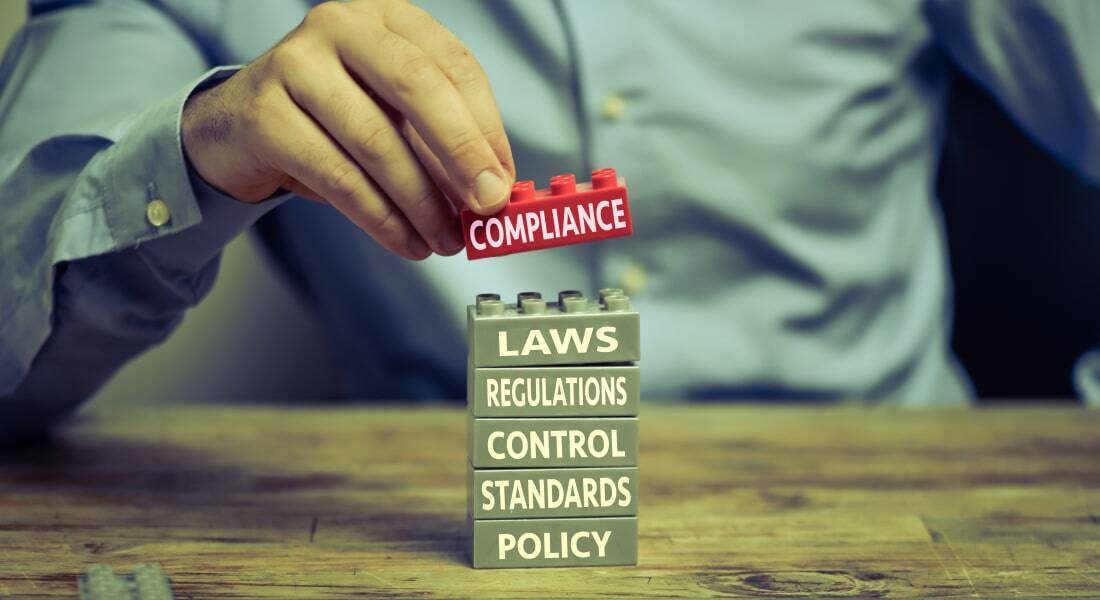How to Redefine Compliance Training as Something to Look Forward To!

In the complex weave of corporate success, compliance training isn't just a checkbox—it's the cornerstone of a resilient and responsible organizational culture. Weaving together legal acumen, risk mitigation strategies, and ethical fortitude, compliance training serves as the compass guiding businesses toward sustained excellence and stakeholder trust. In this blog, we will explore why compliance training is indispensable, uncover the pivotal mandatory training topics, and chart a course toward training formats that resonate with modern learners.
→ Download Now: Instructional Design Strategies to Design Engaging eLearning Courses
Table Of Content
- What is Compliance Training?
- Why is Compliance Training Perceived Boring?
- Why is Compliance Training Important?
- What are the Mandatory Compliance Training Topics for All Employees?
- How to Ensure Compliance Training Truly Serves its Purpose?
- Compliance Training Examples
What is Compliance Training?

Compliance training is a structured employee training program designed to educate employees on laws, regulations, and company policies relevant to their job roles and industry. Its goal is to ensure that workers understand and adhere to ethical standards and legal requirements, thereby reducing risks and promoting a culture of accountability within the organization. Topics often covered in corporate compliance training include workplace safety, data protection, anti-harassment policies, and other regulations specific to the industry. By fostering awareness and understanding, compliance training helps organizations avoid legal troubles and maintain a positive reputation.
Why is Compliance Training Perceived Boring?

Most employees see compliance training as just another box to check—a tedious task to cross off their to-do list. And honestly, it’s no surprise. For years, compliance training has been approached in a way that prioritizes completion over engagement. Organizations often focus solely on ensuring employees finish these sessions, driven by deadlines and regulations, rather than considering how the material is presented or whether employees find it meaningful.
This “checklist mentality” has created a culture where compliance training is seen as a chore rather than an opportunity to learn and grow. Without innovation in how these corporate trainings are designed whether through interactive formats, relatable scenarios, or fostering genuine engagement, employees are bound to lose interest leading to minimal retention and understanding of critical information.
Why is Compliance Training Important?
Legal Compliance
Compliance training ensures that employees are well-versed in the laws, regulations, and industry standards that are relevant to their roles within the organization. This understanding helps them adhere to legal requirements, reducing the risk of non-compliance and potential penalties. For example, employees in healthcare must be trained on HIPAA (Health Insurance Portability and Accountability Act) regulations, while those in finance need training on anti-money laundering laws. By ensuring legal compliance, companies safeguard themselves from costly legal battles and reputational damage.
Risk Mitigation
Compliance training goes beyond legal requirements to encompass broader risk mitigation strategies. For instance, training employees on safety protocols not only prevents workplace accidents but also minimizes the associated costs and liabilities. Similarly, educating employees about cybersecurity best practices reduces the risk of data breaches, protecting sensitive information, and preserving customer trust. Ethical standards training helps mitigate risks associated with unethical behavior, such as fraud or corruption, which can have severe consequences for a company's reputation and financial stability.
Enhanced Reputation
A company's commitment to compliance and ethical conduct is a cornerstone of its reputation. By demonstrating a strong compliance culture, organizations build trust with stakeholders, including customers, investors, and regulatory bodies. This trust translates into a positive reputation, which can be a competitive advantage in attracting clients, investors, and top talent. Moreover, a reputable image can lead to increased brand loyalty and market share.
Improved Employee Performance
Compliance training extends to areas such as diversity, equity, inclusion, and anti-harassment, contributing to a positive work environment. When employees are trained on these topics, they gain a deeper understanding of diversity issues, respect for differences, and skills to foster inclusivity. This, in turn, boosts morale, enhances teamwork, and improves productivity.
Ethical Leadership
Corporate compliance training plays a vital role in shaping ethical leadership within an organization. By instilling ethical values and principles, employees are empowered to make ethical decisions in their day-to-day work. This fosters a culture of integrity, transparency, and accountability, where employees feel confident in speaking up about ethical concerns. Ethical leadership sets the tone for the entire organization, influencing behavior at all levels and contributing to a culture of corporate responsibility.
What are the Mandatory Compliance Training Topics for All Employees?
Compliance Training is the Cornerstone of Business Success
Here’s what you should cover in mandatory compliance training program for all employees:
- Workplace Safety Training
- Cybersecurity Training
- Diversity, Equity, and Inclusion (DEI) Training
- Anti-harassment Training
- Business Ethics Training
Read on to explore various engaging learning formats to make compliance training fun and interactive.
1. Workplace Safety Training
Let's talk safety! Workplace safety training isn't just about ticking boxes—it's about keeping everyone safe and sound. It is vital to ensure a safe work environment and prevent accidents or injuries. To ensure your employees have effective workplace safety training, you can plan interactive simulations where they dive into different work scenarios, practicing safety protocols like pro. Hands-on workshops are also a fantastic way to offer rehearsals for real emergencies, whether it's a fire drill or learning first aid. And virtual reality training? It's like stepping into a virtual office, sharpening your learners’ skills to spot hazards and respond like a champ.
2. Cybersecurity Training
According to Gartner, global cybersecurity is spending to hit $212 billion by 2025 which highlights the need for cybersecurity training — it’s a shield for protecting sensitive data and systems. However, designing engaging cybersecurity training can be challenging. You can try various learning formats to design an impactful corporate compliance training program. You can design eLearning modules giving the lowdown on data protection and password security. Live webinars are like interactive hangouts where learners stay in the loop about evolving threats and learn how to tackle them. And those simulated phishing exercises? They're like practice rounds for spotting and handling real cyberattacks like pros.
3. Diversity, Equity, and Inclusion (DEI) Training
DEI training is all about fostering a workplace where everyone feels respected, valued, and included. Interactive workshops make it easy for employees to engage in open discussions, helping build understanding and empathy. These sessions create a safe space for tackling sensitive topics, encouraging mutual respect and awareness. Unconscious bias training helps everyone recognize their own biases and provides practical tips for reducing them in daily decision-making. Plus, setting up Employee Resource Groups (ERGs) is a fantastic way to keep the conversation about diversity and inclusion going strong.
Ready to create a more inclusive workplace? Let’s find out if your organization is truly DEI-ready!
4. Anti-harassment Training
Anti-harassment training is essential for ensuring a safe and welcoming workplace. Through scenario-based training, employees learn to identify and handle instances of harassment or discrimination. Role-playing exercises give them a chance to practice responding effectively in real-life situations. By exploring case studies, employees see firsthand how proactive intervention can resolve harassment issues and prevent them from happening in the first place.
5. Business Ethics Training
Business ethics training helps employees navigate ethical dilemmas with integrity. Engaging in thought-provoking discussions on ethical challenges they may encounter in their roles gets everyone thinking about the right course of action in tricky situations. Ethical decision-making frameworks offer clear guidelines to follow, making it easier to choose wisely when faced with complex issues. Real-world scenarios present employees with practical dilemmas to analyze and resolve thereby providing practical experience in analyzing and resolving ethical dilemmas, enhancing their ethical reasoning, and boosting employees' confidence in their decision-making skills.
How to Ensure Compliance Training Truly Serves its Purpose?
The 8 Fixes to Make Compliance Training Engaging
- Make it realistic
- Present case studies
- Make it interactive
- Add Real-life Scenarios
- Leverage microlearning
- Incorporate storytelling
- Include multimedia
- Go mobile
When employees don’t understand the importance of compliance training, it can put the whole organization at risk. Hence, to avoid any legal and reputational complications, it is important to make corporate compliance training engaging and effective. Let’s see how!
Make Compliance Training Realistic
The major reason employees do not take online compliance training seriously is because they do not know the actual purpose. Since the training is usually mandatory, they end up feeling they are being forced. Remember the good old adult learning principles by Malcolm Knowles? One of the five principles says adults are more interested in engaging with subjects that have immediate relevance and impact on their jobs. Hence it is highly vital to link compliance training to the real world and on-the- job situations to make learners understand that the training being provided indeed will have an impact on their job.
For instance, if you want to train your employees on Conflicts of Interest (CoI) compliance, you can give them a scenario between an employee and a competitor. In one of the test cases, the employee supports the competitor intentionally for his personal gains. You can show another case where an employee misses out on taking permission before working for a competitor. Such cases compel your employees to think before they proceed. These scenarios help them discern whether what they do is accurate or inaccurate. They are given various options to choose from and this selection lets them think what is right and what is not. They receive immediate feedback irrespective of the right or the wrong answer, and it helps them get an in-depth understanding of the COI compliance.
Present Actual Case Studies of Positive Experiences
Compliance training is all about providing training to employees to ensure they stay compliant. Another great way to train them on this topic and help them understand the relevance is by presenting actual case studies within the course. Specifically speaking, case studies of situations where staying compliant benefitted organizations can be presented. Once learners are aware of how staying compliant in a particular situation helps, they will definitely realize the importance of the course, paying more attention and changing their attitude toward online compliance training.
For example, if you want to deliver fire safety training measures, you can provide learners with a case study of how adhering to fire safety measures aided in reducing the overall fire accidents within an organization. This will help them understand the benefits of the training.

Instructional Design Strategies to Design Engaging eLearning Courses
Design Learner-Centric eLearning
- Importance of ID Strategies in eLearning
- Parameters to Select the Right ID Strategy
- ID Strategies for Effective Results
- Case Studies
Make Compliance Training Interactive
When you want your employees to learn a serious topic like compliance, you need to give them a reason to take the training. A traditional classroom session would lull them to sleep. Hence, you can opt for an eLearning course that has game elements incorporated in it. The touch of gamification keeps them engaged and motivates them to do better. It offers challenges and rewards. Challenges attract them and rewards motivate them. For instance, a safety training program, when infused with game elements, draws the learner to the training in spite of the dry subject.
An eLearning course is designed where an employee needs to escape out of a workplace on fire. It prompts the employees to learn the correct exit procedure in case of a fire incident. They should know to avoid the lifts and use the staircase; to rush to a common, designated area where all employees are supposed to gather on such occasions. During the course, whenever he misses out to opt for the right action, he loses points. Then he gets immediate feedback on why he was wrong or right. This kind of immediate response lets him learn better and retain the knowledge for long.
Our eLearning Sample Course on Fire Safety - See it in Action!

Ensure Relevance through Real-life Scenarios
Scenarios give your employees an opportunity to experience the real-life situations that they may face in their work. For instance, if you want to train your employees on Conflicts of Interest (CoI) compliance, you can give them a scenario between an employee and a competitor. In one of the test cases, the employee supports the competitor intentionally for his personal gains. You can show another case where an employee misses out on taking permission before working for a competitor. Such cases compel your employees to think before they proceed. These scenarios help them discern whether what they do is accurate or inaccurate. They are given various options to choose from and this selection lets them think what is right and what is not.
Discover how scenario-based learning can make compliance training more engaging and practical.
Reinforce Training with Microlearning
It is often noticed that the important aspects of compliance training are lost within a sea of information. This is another reason learners cannot relate to online compliance training as topics of compliance, be it laws or policies are often very lengthy. As long as you do not provide information that is on the point and makes sense to learners, there is no way they are going to pay attention. Hence, ensure you break the training content into different modules making it short, crisp, and focused.
Well, this is exactly what microlearning is all about. Delivering training using the microlearning strategy helps learners focus on one single learning objective per module. Additionally, microlearning can be delivered in a wide variety of formats such as videos, infographics, PDFs, and podcasts. For example, you can train your employees on data privacy regulations using microlearning videos.
Use Storytelling to Make Compliance Training Memorable
One of the best ways to improve compliance training is by using storytelling to make regulations more relatable. Policies and rules can often feel abstract and hard to apply in real life. By adding relatable stories to your eLearning courses, you can create a more engaging and impactful experience for learners.
Start by crafting stories that reflect the challenges employees face at work. These should highlight common compliance dilemmas, making them relevant to daily responsibilities. Introduce relatable characters, like a colleague or supervisor, to help learners connect emotionally and better understand the complexity of compliance decisions
Include A Variety of Media Elements
Text-heavy content holds the risk of losing your employees’ attention. Hence, it is advisable to include a variety of media elements in your training modules. Using images, videos, and animations add life to the mundane compliance training courses and keeps your employees engaged.
Images can be a great way to summarize key information. Adding visual content gives a break to long bodies of text and also appeals to multiple senses at once. This increases employee engagement and boosts productivity, thereby increasing the overall organization’s efficiency.

Instructional Design Strategies to Design Engaging eLearning Courses
Design Learner-Centric eLearning
- Importance of ID Strategies in eLearning
- Parameters to Select the Right ID Strategy
- ID Strategies for Effective Results
- Case Studies
Go Mobile
Do not restrict the choice of accessing compliance training to just the desktop. Learners should be given the flexibility to choose the medium in which they can access training. Hence ensure your online compliance courses are truly responsive, allowing learners to access courses as and when they want to, rather than when they are required to.
At times, delivering an entire compliance course in a mobile device will not be possible. In this case, micro videos, PDFs, infographics, etc., can be provided, covering important aspects such as ‘Things to Remember’ or ‘Dos and Don’ts’. These act as a mode of performance support, allowing learners to access relevant information as and when they require it.
Discover how mobile learning can transform compliance training making it easier than ever to learn anytime, anywhere!
Compliance Training Examples
Building Security Awareness Through Fun & Games — A Success Story
How do you turn dry information security training into something employees actually enjoy? We tackled this challenge with a creative twist involving scenarios and gamification. The result? A fun, engaging experience that boosted awareness and action against workplace security threats. Want to see the full story behind this transformation? Click the image below to access the details!
Workplace Hazard Identification Training — A Success Story
How do you train a diverse, global workforce to achieve a ‘Zero Safety and Environmental Incidents’ goal? With an innovative eLearning solution that’s interactive, multilingual, and accessible anywhere. Launched on World Safety Day, this training took workplace safety to the next level. Curious about the results and how it all came together? Click the image below and dive into the full story!
Wrapping up!
As we navigate the landscape of mandatory compliance training, let's not merely meet requirements but strive for excellence. Handing over hefty compliance handbooks to your employees or making them sit through lengthy eLearning modules can demean the purpose. By embracing the significance of compliance training and tailoring impactful training programs, businesses can forge a culture of compliance, integrity, and accountability—an enduring testament to organizational success and stakeholder confidence.
Designing effective eLearning courses for compliance training is backed by sound knowledge of instructional design. It helps you choose the right learning format for designing engaging courses. Here’s an eBook that’ll walk you through powerful instructional design strategies to design learner-centric courses. Get your copy now!










![How to Design Impactful eLearning? Unveil the Secrets [Comprehensive Guide]](https://blog.commlabindia.com/hubfs/blogs/elearning-impactful-design-aspects-info.jpg)
